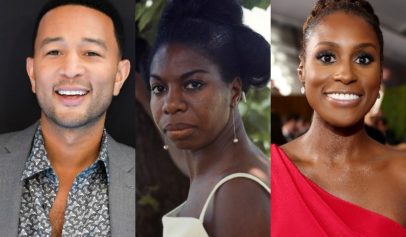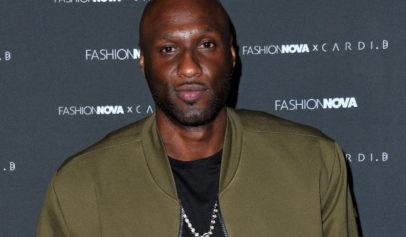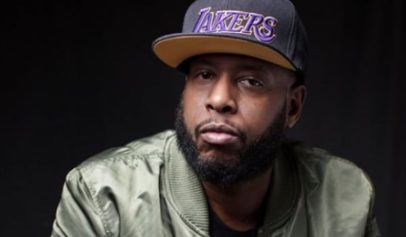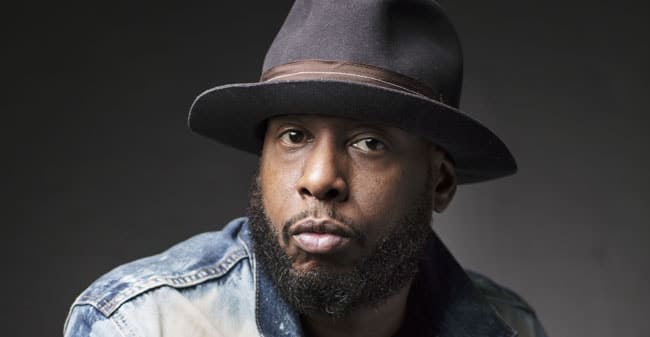
Hip-hop veteran Talib Kweli, who is releasing a new album titled “Radio Silence” next month, has been making politically conscious music for two decades. (Photo by Dorothy Hong)
Like a romantic couple strolling through the park, music and politics usually go hand in hand. As far as hip-hop goes, rappers have often touched on the political and social issues of the day, and Talib Kweli has been one of the genre’s strongest and most important voices.
We recently discussed a myriad of topics with the Brooklyn rapper, who’s dropping a new album titled “Radio Silence” on November 17 that can be purchased on his KweliClub website.
During the conversation, he had a lot to say about the rise of white supremacy in the United States, Colin Kaepernick, the Ohio teen Bresha Meadows, and, of course, Donald Trump, who he’s been watching long before his presidency.
“[Trump] got on Fox News for eight years to say ‘That n—– Obama was not born here,’ and that’s all it took,” Kweli stated.
Kweli also said those same visits to Fox News are what gave some people in the United States the courage to organize and attend the white supremacist rally in Charlottesville. He blasted some of the media outlets as well for what he said was a lack of coverage concerning the growth of neo-Nazism in the States.
“The mainstream media didn’t even deal with the threat of neo-Nazism until they killed a white woman,” Kweli said.
Kweli said that since he’s often involved in online race discussions and draws them in because of his reputation as an activist, he gets a lot of abuse.
“On a personal level I was being attacked and harassed by straight-up Nazis and white supremacists every day during Trump’s campaign, and the more Trump became popular the more I would see it grow,” he explained. “At this point, I get called n—- four or five times on Twitter a day. … I have never had nobody call me n—- more than I have this year.”
Kweli also said that a lot of folks were oblivious to Trump’s growing popularity before he announced his candidacy, and they didn’t pay attention to the racist discussions that were happening online.
In fact, the rapper said many still don’t take the problem of online bigotry seriously, which is one of the reasons the alt-right has gained such a strong collective voice.
“It’s frustrating to me for people to say ignore online bigotry in 2017,” said the “Eardrum” creator. “‘They’re just racist trolls [some say].’ No, they’re not. These are people who are using Twitter and using Facebook very effectively, more effectively than so-called social justice workers. Very effectively to organize and say ‘This is our position, and this is what we need to do to get there.’”
Related news: Trump, Activism and Hip Hop
Are Today’s Rap Fans Annoyed by Conscious Hip-Hop? Dead Prez’s Stic.man and Dee 1 Weigh In
Will Donald Trump Respond To Gregg Popovich’s Criticism?
Kweli then touched on more of today’s hot-button issues during the interview, as he’s been known to do. But, of course, he built that reputation through dropping thought-provoking, well-worded bars with his partner Yasiin Bey, previously known as Mos Def.
This past September 29 marked the 19th anniversary of pair’s classic album “Mos Def & Talib Kweli Are Black Star,” and in one fell swoop, they both became flag wavers for the brand of rap music created by socially conscious groups like A Tribe Called Quest and De La Soul.
Prior to that the rapper born Talib Greene spent much of his time working in the famed Nkiru Books in Brooklyn and honing his skills with other unsigned MCs in New York’s Washington Square Park.
This was after he dropped out of New York University, and right before he would release the Black Star album and become famous.
“I remember when Black Star dropped, and then a month later it was like, OK, I’m on BET, I’m on MTV, and my life changed pretty quickly in that moment,” he recalled.
From there, the talented wordsmith would drop a slew of critically acclaimed LPs, some solo and two with Cincinnati producer Hi-Tek as part of the group Reflection Eternal. He’s also in a group with the Philadelphia singer Res called Idle Warship.
To date, Kweli has been in the game for about two decades, and today he tours a whopping 250 days out of the year, arguably more than any rapper in the industry.
Additionally, he maintains an incredibly loyal following around the globe and has a career that’s lasted far longer than many of the so-called mainstream artists of his era.
In fact, some of Kweli’s peers like Bey, The Roots and Common were not only considered underground when they hit the scene but underdogs — in terms of having lasting, profitable careers — and now they’re all stars still selling records and landing gigs in the movies and on television. It’s something that Kweli attributes to their early songs and sincere lyrics.
“With all due respect to Yasiin and Common, who also shored up their brands by becoming such brilliant actors, they would tell you as well as I would, it really comes back to the rhymes that really got them that [longevity,]” Talib explained.
Kweli also made the point that there were probably hundreds of thousands of records that sold bigger numbers than artists like Nina Simone, Stevie Wonder and Bob Marley, but those artists stood the test of time due to their positive influence on the culture.
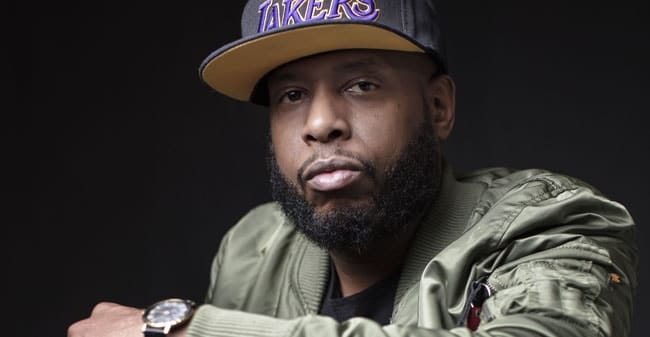
Talib Kweli believes it’s a mistake to dismiss the alt-right’s online presence as mere trolling that can be ignored. (Photo by Dorothy Hong)
In August, Kweli released a song about Bresha Meadows titled “She’s My Hero” after he learned that she felt forced to kill her father after years of family abuse. He said the story deeply touched him, and he was taken aback that it wasn’t discussed a lot more.
“I wrote the song at the end of last year,” he explained. “I saw basically Black women online really pushing that story, but I didn’t really see it in the mainstream. There’s some feminist groups, some domestic violence groups that were supportive, but the story didn’t really break mainstream, and I felt that it was an important story.
“It’s something that happens in our communities far too often,” added the rapper. “And the idea that a child would be put in a position where they felt like the only way out of this position is to kill our father, is something that [disturbed] me. I felt that it was something that I needed to speak on.”
Kweli also said he deplores the violence Meadows was forced to endure.
“I certainly don’t believe in hitting children,” he said. “I certainly don’t believe in corporal punishment. I’m not a fan of that at all. … I wasn’t raised in a household where we were hit, so I don’t understand, I don’t relate to the psychology behind ‘You’ve got to smack a kid.’”
“That would be my advice,” added Kweli. “From the studies I’ve read, along with my personal experience, I don’t think hitting [or] violence solves anything. I don’t think violence solves anything with your enemies, much less with your family.”
But what actually will solve something, Kweli said, are the recent protests in sports, where NFL players have been kneeling before and during the playing of the national anthem.
He praised Kaepernick for starting the movement in the first place and is deeply bothered that he’s been seemingly ousted by the NFL for protesting peacefully.
At the same time, however, Kweli said the quarterback is much bigger than football at this point, and he’ll be just fine.
“[Colin] Kaepernick is going to go down in history as a Muhammad Ali type, as a Jesse Owens type,” he stated. “Him taking a stand was very, very, important. He did it in the civil rights tradition. The man is absolutely brilliant. White supremacy only works if we give them everything to have a job. To have a semblance of security.
“Protests aren’t meant to be convenient. Protests are meant to make people uncomfortable, and he did it in a way where he wasn’t breaking the rules, but did it in a way where he was respectful. I mean, what’s more respectful than taking a knee?
“Where are we supposed to protest?” Kweli added. “How are we supposed to protest? If a famous Black man can’t take a knee, which is the most peaceful action, almost submissive, and that’s too much, what kind of protest is acceptable? And when you start to ask that question, you realize for a Black man ain’t no respectable protest. Just shut up, bend over and take it.”
